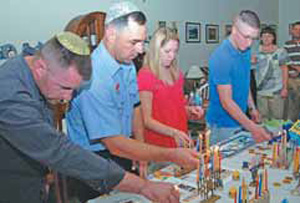
In the 21st century, Chanukah is celebrated by more Jews than any holiday other than Passover. Both are performed at least one night a year by almost 90% of American Jews, more than the number who observed Chanukah in the 1930s. The sociological reason is surely related to the competition with a commercialized, publicly observed Christmas and holiday season.
Yet Jews could have also adopted a secularized Christmas, as many German Jews did in the 19th century and early 20th century. If social pressure and a desire to be like everyone else and make sure children are not left out were the only reasons, then one need not enhance a separate Jewish holiday that highlights the very difference that makes many American Jews uncomfortable. There was also counter-pressure to assert one’s ethnic and religious identity against the majority. Thus, whatever the social reasons for Chanukah, Jewish educators developed an ideological rationale that became very popular.
Reform and Conservative Jews led the way in this Americanization of Chanukah, not only by inventing the custom of giving eight gifts, one per night, and using colored candles, unknown beyond its shores, but also by reshaping the message of the menorah’s light to fit the American Jewish predicament.
The Reform reinvention was striking, because there are elements in Chanukah that could be difficult for classical Reform Jews to adopt. For the Maccabees, Chanukah is celebrated as the rededication of the altar desecrated by the Greek Syrians who sacrificed pigs on that altar to Zeus, but Reform Jews do not pray to return to sacrifices and to rebuild the Temple in Jerusalem.
The Maccabees fought to achieve political independence for a separate Jewish nation in the Jewish homeland by trying to expel Western culture (Hellenism) by acts of military heroism. But classical Reform Judaism was non-nationalist, anti-Zionist, and pacifist in orientation, and committed to integration within Western civilization in their own lands.
Mattathias killed a Jew who publicly worshipped Zeus when Antiochus’s men came to enlist supporters, and Judah the Maccabee forcibly circumcised Jewish babies when their parents wanted to be more Hellenized or were simply afraid of reprisals by the Greek Syrians. In contrast, freedom of conscience, faith in God, loyalty to the state, and an ethics of peace and reason have been central Reform values.
Thus, it should not be surprising that Isaac M. Wise, who introduced Reform Judaism in the United States, suggested in 1865 the elimination of the Chanukah lights. But six years later, the Augsburg Synod, with delegates mostly from German Reform congregations, introduced a resolution urging the appropriate commemoration of Chanukah, which had been neglected in many Reform Jewish congregations and schools. The rationale for this resolution was to counteract the celebration of Christmas by many Jewish families “in direct opposition to Jewish consciousness.”
One hundred and fifty years later, American Jews continue to give great significance to Chanukah as a counterweight to Christmas. But they have also made Chanukah a major symbol of America Jewish values. A 1971 Reform curriculum for children written by Harry Gersh said Chanukah was “the first for the right of a people within a country to believe as they wish–so long as they followed the king’s law in worldly matters. For thousands of years, Jews have lived under kings, princes, dukes, caliphs, governors, presidents. And they have always been loyal to these rulers–so long as they were permitted to practice their own religion. This idea of religious freedom is followed in all free nations today. It was first given to the world by the Jews.”
The battle of the Maccabees against the religious and political coercion of Antiochus was a battle for collective religious, hence national political, freedom, but not for individual freedom of conscience as such. Yet the Reform interpretation is certainly as valid as any rabbinic reading of the past, and it makes Chanukah central to the American Jewish concern for maintaining its difference within a democratic land.
Reform Jews have become, at least since the Holocaust, strong supporters of Zionism. And so nowadays, Chanukah can also represent for them, as it does for Israelis, a war of independence and a model for the virtue of military courage in a just war. Still, some liberal Reform Jews, especially during the protests against the War in Vietnam, have felt ambivalent about militant nationalism. But I think it is still true to say that liberal American Jews hold that Chanukah candles represent a value that they are proud to propagate in the public sphere: the banner of religious freedom for every individual.
This is the central value for American liberal Jews and for liberal Americans, and that bridges the tension between Jewish and American identity, so the Jews need not feel so uncomfortable with being different. This rationale is as important as the eight presents.
Noam Zion is a Fellow of the Shalom Hartman Institute and author of A Different Light: The Chanukah Book of Celebration.
By Noam Zion/JNS.org









